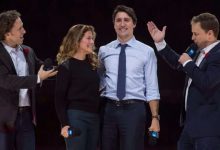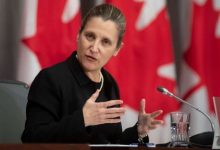Trudeau’s long campaign to join UN Security Council winds down as ambassadors vote
Prime Minister Justin Trudeau’s long campaign to see Canada elected to a temporary seat on the UN Security Council culminates Wednesday in New York as ambassadors from member states prepare to vote.
Confined to his own country for the past three months, Trudeau has chatted up more than 40 national leaders — from Senegal to Spain, from Uganda to Ukraine — in his bid to beat either Ireland or Norway for one of two remaining seats now up for grabs.
Just yesterday Trudeau spoke with the prime ministers of Saint Vincent and the Grenadines, India, Pakistan, Spain, Ethiopia and the presidents of Angola and Mexico. Last week he spoke with the prime ministers of Saint Kitts and Nevis, Fiji, North Macedonia and the presidents of Rwanda and Panama.
And it’s not only the prime minister who is working the phones. Officials and ministers are calling their foreign counterparts as a part of the final, frantic push for votes.
Should Canada win, it will become one of ten temporary members of the council joining the table for a two-year term. The real power and influence will continue to reside with the council’s five permanent members: the United States, the United Kingdom, France, Russia and China which hold the power to veto resolutions.
Every year the UN General Assembly elects five countries to the Security Council. The votes are conducted by secret ballot and countries have to secure a two-thirds majority to win. If Canada does not secure that majority on the first round it will have to battle it out until a winner emerges.
The process could be tied up swiftly in Thursday’s second round of voting, or it could drag on. In 1979 it took 155 rounds to fill a seat.
Canada has been elected to the Security Council six times since the 1940s but its last bid, in 2010, ended in failure for the first time with Germany and Portugal taking the two seats Canada was aiming for.
Trudeau says securing a seat is not an end in and of itself, but a way for Canada to “continue to be influential” around the world.
“Over the past number of months, whether it’s been on COVID, whether it’s been on development and financial reform, whether it’s been on climate change, whether it’s been on a range of things from peacekeeping to security to women, we have been moving forward and leading the way,” Trudeau told reporters Tuesday.
“Regardless of what happens in the campaign, we are more engaged and we will continue to be more engaged on the world stage.”
Canada’s success depends in part on what it can bring to the table that Norway and Ireland cannot. As one expert points out, the countries hold similar profiles on the world stage that makes differentiation challenging.
“There are lots of fine differences, but to be quite honest, these are three peas in a pod if you will. They’re very similar countries with long histories of supporting the UN,” said Richard Gowan, who oversees the International Crisis Group’s advocacy work at the UN.
Some of those differences include both Norway and Canada being members of NATO while Ireland is not. Another is Canada’s close and supportive relationship with Israel.
‘We see you as family’
Deputy Prime Minister Chrystia Freeland says Canada’s voice in the world is more important than ever, especially when it comes to standing up for things like the rules-based international order which she says “is under threat.”
“Some of the principles and ideas that Canada stands for are needed in the world today as never before: feminism, speaking up for diversity, speaking up for human rights, speaking up for the environment; these are all central values for our government and they are issues that Canada champions around the world,” Freeland told reporters in Ottawa.
Mia Mottley, the prime minister of Barbados, says Canada has done enough to earn her country’s vote.
“We as a country have made a very clear determination that we will be supporting your country,” she said Tuesday on CBC’s Power & Politics. “We see you as family.”
Mottley said Trudeau has been very helpful to her region of the world and has personally written to the International Monetary Fund and the World Bank to get those institutions to rethink how they will provide pandemic-related economic support to middle income countries.
But what Canada brings to the table, the values it represents, the issues it pledges to push once it gets to the Security Council are not always factors for countries when they are considering who to support. Sometimes the thinking behind the vote is much more superficial.
“About 60 out of 190 states in the organization vote purely on the whim of their ambassadors in New York, and those ambassadors often promise their votes to all three candidates, and no one is quite sure who is telling the truth to whom,” Gowan said.
CBC








Redes Sociais - Comentários